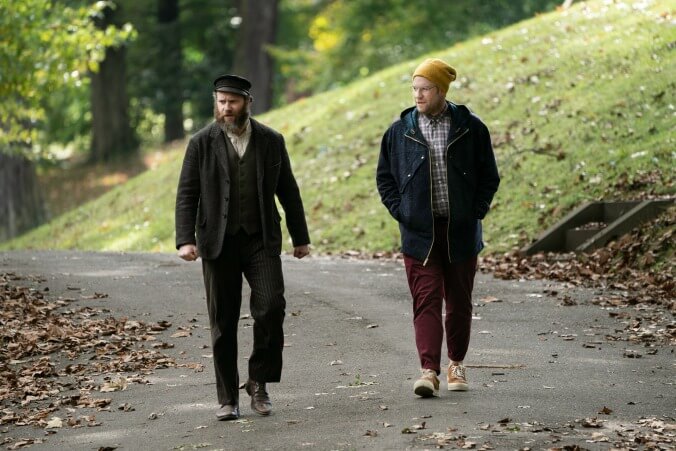Two Seth Rogens get into An American Pickle, with mixed results

For much of his unlikely and surprisingly consistent career as a leading man, Seth Rogen has stuck with great success to the signature elements that made him pop out from the Freaks And Geeks cast: the deep voice, the guttural laugh, the self-effacing demeanor that occupies the exact intersection of stoner and nerd. Rogen has, over his decade-plus of stardom, occasionally re-contextualized that persona for effective dramatic performances in auteur-driven works like Take This Waltz and Steve Jobs. But in An American Pickle, the comedian’s latest self-produced project, he pushes the boundaries of what constitutes a Seth Rogen performance in what very much fits the profile of a Seth Rogen comedy: a movie about a guy who falls into a large pickle barrel, gets preserved in brine for a century, and wakes up in contemporary Brooklyn.
Plenty of past Rogen vehicles have referred to his real-life Judaism, but never as explicitly or often as does An American Pickle, in which he stars as the unlucky and literally pickled Herschel Greenbaum. Before his brine mishap, Herschel is an impoverished ditch-digger in Eastern Europe, where he courts his beloved Sarah (Sarah Snook) with the faint promise of a somewhat better life, one that has fewer vicious Cossack raids. They immigrate to America around 1920, and after settling in Brooklyn, Herschel gets his job at the pickle factory and makes his living—though certain luxuries, such as seltzer water, remain out of reach. Before his family can work their way further up the socioeconomic ladder, Herschel has his accident, and jumps forward 100 years. “What’s the science behind this?” viewers may ask, around the time the movie poses this question verbatim, then cheekily muffles the response with Herschel’s narration, insisting that it’s all very credible.
This moment, among others in the opening section, represents a different form of deadpan gag for Rogen, more conceptual and presentational than his usual dialogue jokes or CG-assisted slapstick. The material comes from a short story by former SNL writer and sometime New Yorker contributor Simon Rich, who also wrote the screenplay; there’s an old-fashioned Woody Allen sensibility in the movie’s amusingly capricious plotting, which sends Herschel on a series of bizarre missions to reclaim his family’s honor. Naturally, this involves bringing accidentally artisanal pickles to the streets of Brooklyn.
If Rogen playing an accented early-twentieth-century immigrant represents a major stretch, so, in a way, does his other role in An American Pickle: Herschel’s great-grandson Ben Greenbaum, who has no cadre of stoners with which to crack wise, nor the slacking inclinations of Rogen’s other big Ben, the guy from Knocked Up. (The original Rich story, which is told from Herschel’s point of view, involves a more insufferably self-involved young descendant, and is even more Allen-esque.) Pickle’s Ben is a Rogen character reconfigured as an ambitious programmer with a nice apartment, the common ground being his tendency to describe things as “pretty cool, actually.”
At first, Ben, whose parents died in a car crash, happily shows Herschel around gentrified Brooklyn (played, somewhat listlessly, by Pittsburgh). He even uses his seltzer machine to unwittingly fulfill one of his great-grandfather’s most treasured dreams. But in short order, the century of differences between the two men surfaces, as Herschel chastises Ben for his lack of success and familial piety, while Ben fumes over his great-grandpa’s stubborn gumption and religious observation. The antagonism between the two of them is funny, and also expedient, given the one-shots frequently employed to place two Rogens in one scene together.
Yet the rich potential for one-upmanship isn’t fully developed, perhaps out of wariness that An American Pickle might turn into a prank-war companion piece to the Neighbors movies. Rogen, Rich, and director Brandon Trost, a longtime cinematographer on Rogen and Rogen-adjacent projects, instead address the grimness at the heart of the American dream and the immigrant experience, where the miseries of one country are pitted against another to produce an unwarranted optimism. (“Compared to Cossacks,” Herschel notes, Americans are “very friendly.”) The movie has enough early laughs to make one wonder if Rogen is trying to make his equivalent of You Don’t Mess With The Zohan—an unlikely celebration of how Jewish culture has melted into a giant American melting pot of ridiculousness.
This particular melting pot has few ingredients; far from relying on a comic ensemble, Pickle hardly has any notable non-Greenbaum characters at all. The smallness is welcome, but the film fails to build its laughs into substantial comic momentum, or even construct many substantial scenes. (Tellingly, one of its funniest is a mid-credits bonus.) As it progresses, the material feels more and more like a series of slightly amusing paragraphs, with sentimentality wedged uncomfortably between flights of satirical whimsy. As with the movie’s clunky technical fudges in the Herschel-versus-Ben scenes, there’s no sleight-of-hand in how it introduces the supposed poignancy of two incompatible men serving as each other’s only living relatives; the script just blurts that out, denying any sense of hard-won reconciliation. Rogen’s comedies have often layered broad laughs with humanity and thematic ambition. Here, like Herschel and Ben, they aren’t especially convincing sharing the frame.